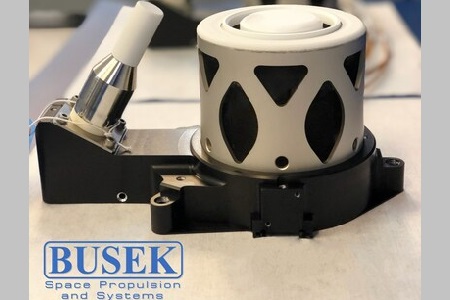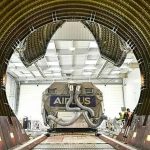The OneWeb satellites launched in December and January also are providing flight heritage for Buseks BHT-350 solar electric propulsion systems.
 The in-space propulsion firm Busek Co. Inc. (Busek) has announced the successful on-orbit commissioning of its BHT-350 Hall effect thrusters on a duo of launches. The thrusters were sent aloft on OneWeb’s 15th and 16th missions, which utilised separate SpaceX Falcon-9s to deliver 80 spacecraft into low Earth orbit (LEO). The Busek thrusters are utilised for orbit-raising, station-keeping, collision avoidance, and de-orbit.
The in-space propulsion firm Busek Co. Inc. (Busek) has announced the successful on-orbit commissioning of its BHT-350 Hall effect thrusters on a duo of launches. The thrusters were sent aloft on OneWeb’s 15th and 16th missions, which utilised separate SpaceX Falcon-9s to deliver 80 spacecraft into low Earth orbit (LEO). The Busek thrusters are utilised for orbit-raising, station-keeping, collision avoidance, and de-orbit.
The Busek-built engines are now propelling the satellites, built by Airbus OneWeb Satellites, in operational orbits. The latest launches bring a total of 542 satellites launched for OneWeb, the LEO satellite communications company. The launches are the first occasion for the BHT-350 solar electric propulsion systems to fly in space, and it highlights Busek’s rapid-response and thruster manufacturing capabilities.
Dr Vlad Hruby, President of Busek, said: “We ramped-up our manufacturing and supply chain to begin double-digit thruster deliveries within a few months of order. The space community often talks about rapid response and the need for speed, and this is a great example of preparedness, and fast, high-quality execution. We’re at a production rate of over 20 thrusters per month with 100% hot-fire acceptance testing, Busek has the installed capacity to double that production-rate today, and we’re planning to triple that capacity to meet certain near-term programmes.”
The BHT-350 system is designed for demanding small satellite propulsion applications and it offers the performance, long-lifetime, and reliability to meet stringent de-orbit requirements. The unit is compatible with both xenon and krypton propellants, and a future solid-propellant-based offering is in the works. The BHT-350 joins Busek’s Industry-leading stable of flight-qualified electric propulsion solutions including the Hall thrusters, RF ion engines, and electrospray thrusters.
















































































